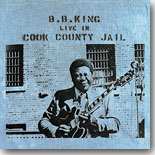
When I was a fledgling blues fan back in the
early/mid ’80s, the very first B.B. King album I
bought was a cassette of Live In Cook County
Jail (MCA/Universal). I’m not sure why I decided
on this particular B.B. King release. It’s been
about 35 years ago and some days I do well to
remember my way to work, but I think it was
mainly because I knew most of the songs listed
on the back cover.
Upon listening for the first time, it was quite
a surprise because I got to not only hear B.B.
King’s music in a raw, unvarnished setting, but
I also got a good glimpse of B.B. King the
performer. A couple of weeks ago I visited the B.B. King Museum at Indianola for the third time,
and while in the adjoining gift shop I came
across a CD copy of Live In Cook County Jail. It
had been a number of years since I’d actually
listened to it, so I picked up a copy to see if
I would still enjoy it as much as I did in those
early years of being a blues fan.
A couple of years before King’s 1970
performance, the Cook County Jail was described
as a “jungle” by the Illinois Crime Commission
and a prison reform group who had recently
investigated the facility. There was an
“everything goes” mindset at the jail and it was
rife with illegal activities: bribery, rape,
murder, drugs and liquor smuggled in and traded,
etc., all under the watchful eye of the prison
officials.
In March of 1968 a black psychologist named
Winston Moore was appointed warden, despite a
complete lack of formal training for the
position. He was the first African American
warden in the U.S., and he plunged headlong into
the process of cleaning up the prison,
confiscating drugs, alcohol, weapons (over 200)
and ending the “barn boss” system, which had
given dictatorial powers to the inmates over
their respective areas. It took Moore a couple
of years to establish his position, but
establish it he did, or otherwise there
probably never would have been an opportunity
for B.B. King to perform in Cook County Jail in
front of 2,117 inmates.
After the brief introductions, where listeners
will hear the inmates roundly boo the introduced
sheriff and chief justice of the criminal court,
King and his band (John Browning – trumpet,
Louis Hubert – tenor sax, Booker Walker – alto
sax, Ron Levy – piano, Wilbert Freeman – bass,
and Sonny Freeman – drums) launch right into a
rapid-paced “Every Day I Have The Blues” to get
the blood flowing. They follow up with the crowd
favorite, “How Blue Can you Get.” King really
does a masterful job with Lucille on the intro,
really cutting loose for nearly three minutes of
the five-minute song, and the crowd is eating
out of his hand by the time he goes into the
familiar “I Bought You A Brand New Ford….”
verse.
Another favorite, “Worry, Worry,” showcases B.B.
the showman as he gives a lengthy monologue on
men, women, and love, which is interesting
given the environment in which he is performing,
but it seems to be effective by the response of
the audience. From there, King tears into a
six-minute medley incorporating some of his
early hits: “3 O’Clock Blues and “Darlin’ You
Know I Love You,” then moving into “Sweet
Sixteen.” The crowd really eats up this trio of
songs and King seems to relish playing them,
giving Lucille plenty of solo space in the
process.
At the time of the performance King had invaded
the record charts with his incredible version of
Roy Hawkins' “The Thrill Is Gone,” and
doubtlessly, there were a few fans there who
were only familiar with that song. To these
ears this is one of the best versions of the
song that King recorded, taken at a slower,
funkier pace and with a very different guitar
run midway through along that same line which is
a real highlight. The set then closes with
another old favorite, “Please Accept My Love,”
where King proved that he was also one of the
blues’ greatest singers.
Live At The Regal has long been recognized as
the greatest live B.B. King recording, and
there’s even some support for Blues is King and
Live In Japan, but personally I would put
Live
In Cook County Jail slightly above the latter
two as a sentimental favorite for King’s stage
presence, his vocals, and of course, Lucille.
--- Graham Clarke